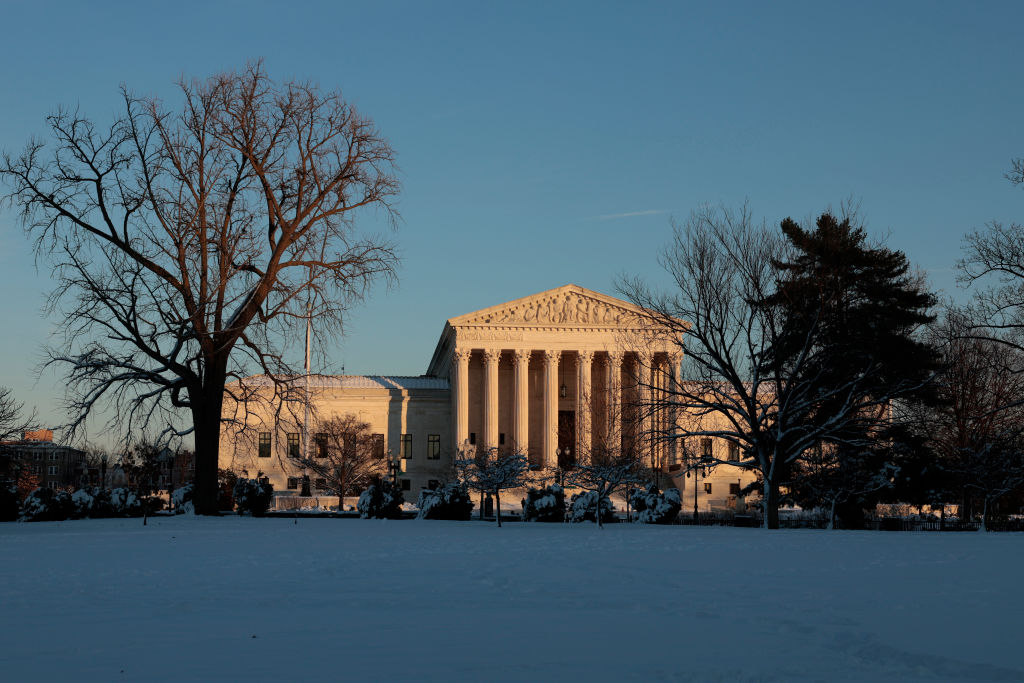Supreme Court looks hesitant to embrace Biden's vaccine plan but open to rule for health care workers


A free daily email with the biggest news stories of the day – and the best features from TheWeek.com
You are now subscribed
Your newsletter sign-up was successful
The U.S. Supreme Court on Friday appeared skeptical of President Biden's broad vaccination-or-testing requirement for the nation's large employers, reports The Washington Post, thus "casting doubt" on the president's "most ambitious plan to fight the pandemic." The justices did, however, seem more likely to back to a separate requirement that "health care workers at facilities that receive federal money be vaccinated," adds The New York Times.
The latter regulation was the subject of the second argument heard by the court on Friday.
The justices' decision on both matters could come quickly, considering they are mulling over "emergency petitions to either allow the regulations to go into effect or stop them," per the Post.
The Week
Escape your echo chamber. Get the facts behind the news, plus analysis from multiple perspectives.

Sign up for The Week's Free Newsletters
From our morning news briefing to a weekly Good News Newsletter, get the best of The Week delivered directly to your inbox.
From our morning news briefing to a weekly Good News Newsletter, get the best of The Week delivered directly to your inbox.
When it came to the large employer mandate, the court's conservative majority was more inclined to believe states or Congress should regulate such decisions rather than the federal government, per the Times. They were also concerned Biden's requirement was too broad; for instance, Chief Justice John Roberts and Justice Amy Coney Barrett asked if OSHA could have instead drafted a "more targeted" initiative based on workplace conditions, per the Post.
The three liberal justices, however, "expressed disbelief" that anyone would try to block Biden's policy while "the pandemic continues to rage," writes the Post.
"We know the best way to prevent spread is for people to get vaccinated," said Justice Elena Kagan. "This is the policy that is most geared to stopping all this."
The administration's rule, which was supposed to go into effect on Jan. 4, mandates employers with over 100 employees require vaccination or weekly testing as a condition of employment. OSHA pushed back the date in response to legal challenges.
A free daily email with the biggest news stories of the day – and the best features from TheWeek.com
Regarding a separate policy for health care workers, justices felt that "in keeping with other kinds of federal oversight," as well as broadly supported by the medical community, per the Times.
Brigid Kennedy worked at The Week from 2021 to 2023 as a staff writer, junior editor and then story editor, with an interest in U.S. politics, the economy and the music industry.
-
 The ‘ravenous’ demand for Cornish minerals
The ‘ravenous’ demand for Cornish mineralsUnder the Radar Growing need for critical minerals to power tech has intensified ‘appetite’ for lithium, which could be a ‘huge boon’ for local economy
-
 Why are election experts taking Trump’s midterm threats seriously?
Why are election experts taking Trump’s midterm threats seriously?IN THE SPOTLIGHT As the president muses about polling place deployments and a centralized electoral system aimed at one-party control, lawmakers are taking this administration at its word
-
 ‘Restaurateurs have become millionaires’
‘Restaurateurs have become millionaires’Instant Opinion Opinion, comment and editorials of the day
-
 Ex-South Korean leader gets life sentence for insurrection
Ex-South Korean leader gets life sentence for insurrectionSpeed Read South Korean President Yoon Suk Yeol was sentenced to life in prison over his declaration of martial law in 2024
-
 Rubio boosts Orbán ahead of Hungary election
Rubio boosts Orbán ahead of Hungary electionSpeed Read Far-right nationalist Prime Minister Viktor Orbán is facing a tough re-election fight after many years in power
-
 Key Bangladesh election returns old guard to power
Key Bangladesh election returns old guard to powerSpeed Read The Bangladesh Nationalist Party claimed a decisive victory
-
 Epstein files topple law CEO, roil UK government
Epstein files topple law CEO, roil UK governmentSpeed Read Peter Mandelson, Britain’s former ambassador to the US, is caught up in the scandal
-
 Iran and US prepare to meet after skirmishes
Iran and US prepare to meet after skirmishesSpeed Read The incident comes amid heightened tensions in the Middle East
-
 EU and India clinch trade pact amid US tariff war
EU and India clinch trade pact amid US tariff warSpeed Read The agreement will slash tariffs on most goods over the next decade
-
 Israel retrieves final hostage’s body from Gaza
Israel retrieves final hostage’s body from GazaSpeed Read The 24-year-old police officer was killed during the initial Hamas attack
-
 China’s Xi targets top general in growing purge
China’s Xi targets top general in growing purgeSpeed Read Zhang Youxia is being investigated over ‘grave violations’ of the law
